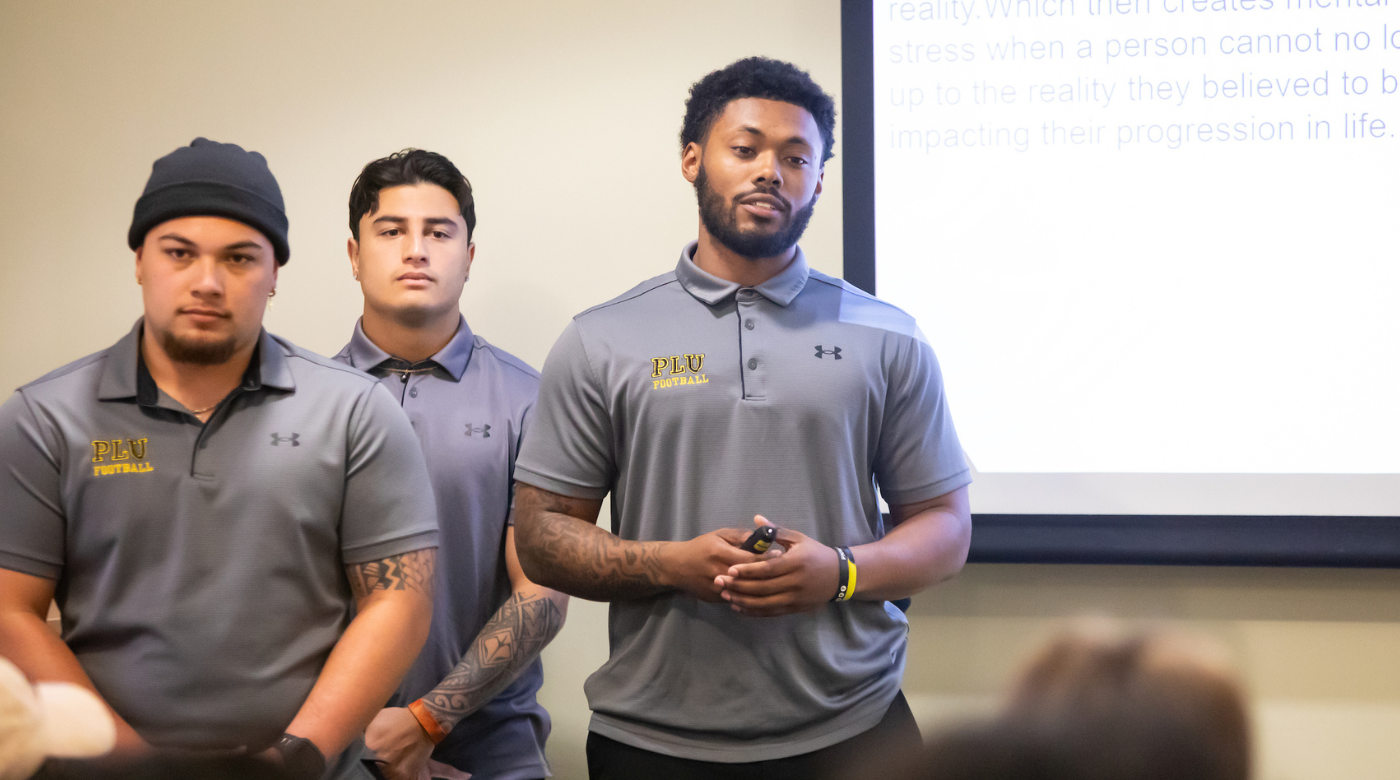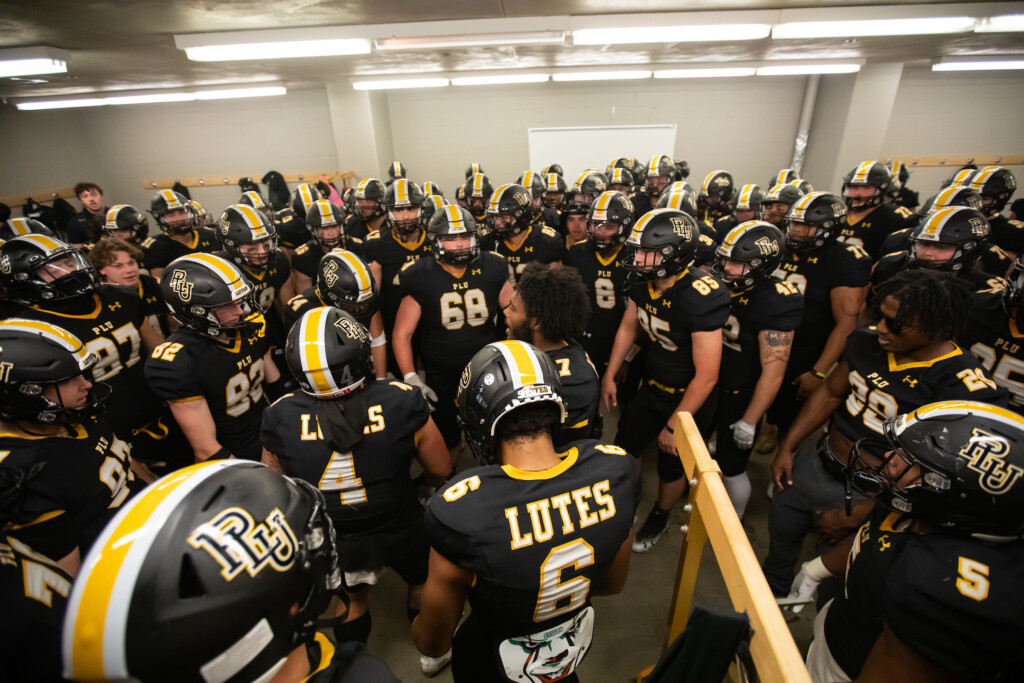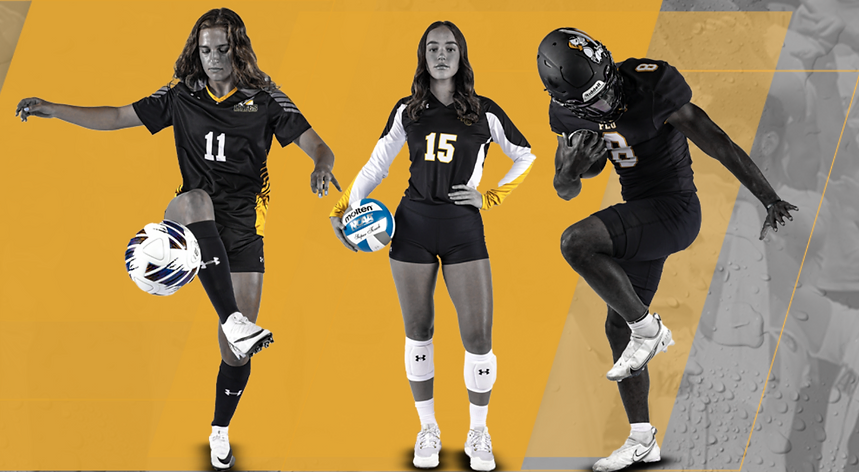Student-athletes Nasier Ford ’24, La’akea Ane ’24, and Jesse Canda ’24 utilize communication capstone to boost mental health awareness

Image: (Left to right) La’akea Ane ’24, a criminal justice and communication major, Jesse Canda ’24, a communication major, and Nasier Ford ’24, a criminal justice and communication major present their senior capstone titled “Mental Health Awareness Amongst Student Athletes.”
By MacKenzie Hines
PLU Marketing & Communications
The PLU capstone project is a meaningful culmination of a student’s academic journey at PLU. It offers students a chance to embrace complexity and ask tough questions.
In a display of remembrance and advocacy, Nasier Ford ’24, La’akea Ane ’24, and Jesse Canda ’24 opened their communication capstone project with a moment of silence, dedicating 38 seconds to honor a teammate lost to mental illness in 2021. The significance of 38 seconds represented their teammate’s football jersey number and reminded them of his lasting impact on their lives.
This tribute set the tone for a presentation to raise awareness and provide coping mechanisms for mental health challenges within PLU’s athletic and student communities. Drawing from personal experiences and research, Ford, Ane, and Canda covered the complexities of mental health issues within the context of student athletes’ demanding schedules and societal pressures.
The presentation detailed a student-athlete football player’s schedule to show the pressure they face. “A typical weekday starts at 6 or 7 a.m. with meetings and practice. They have a few hours between these requirements, but that doesn’t include meals or watching film,” says Canda. “On weekends, regular students can decompress, do homework, or enjoy free time. However, student-athletes have daily requirements. On Saturdays, football players have games, and on Sundays, they must visit trainers for treatment, as they’re often hurt.”

The presentation stressed the significance of recognizing and tackling mental health concerns. They discussed theories, like social judgment theory, to examine the link between navigating performance pressures and coping with injuries while balancing academic and personal responsibilities.
Ford, Ane, and Canda created a dedicated website offering resources, including educational materials on mental health and practical coping strategies. The website fosters openness and support and encourages individuals to prioritize their mental well-being and seek help when needed.
Reflecting on their journey and the impact of their project, Ford, Ane, and Canda express a commitment to continue advocating for mental health awareness beyond their academic endeavors.
Ford says, “I plan to go into law enforcement. I will be dealing with a lot of people, all types of backgrounds. Through our research, I’ve gained a deeper understanding of how mental illness manifests and is addressed, including relevant statistics for Washington state. This knowledge empowers me to approach people from all walks of life with greater sensitivity and understanding, especially as I encounter diverse communities in my work. I’m committed to utilizing these learnings to better serve and support individuals in need, ensuring they receive the required assistance and resources.”
Ane adds, “I am coaching and dealing with athletes and student-athletes. I learned they’re more than just players. Understanding everything we just talked about and implementing it into coaching gives you a different perspective. And I think, personally, it helps me understand players better.”
“I think a big reason I started taking mental health more seriously is because I thought I was alone my first year,” notes Canda. “[Losing my teammate] really impacted me. I want to be the person that people can talk to, especially about my faith and how I really think that’s the answer to many of the problems that we have.”
As they embark on their future careers, all three players will carry a deeper understanding of mental health and the role each person plays in fostering a supportive community – for student-athletes and beyond.



